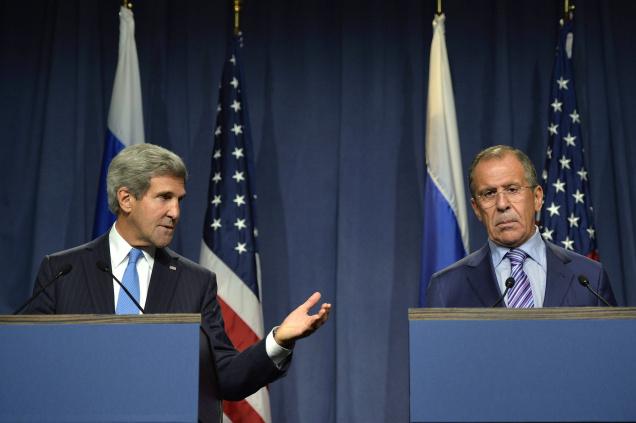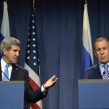
Putin Tries to Build on the Success of His Syrian Coup
Publication: Eurasia Daily Monitor Volume: 10 Issue: 163
By:

During the last week (see EDM, September 12), the diplomatic dance around Syria has acquired the intensity of a whirling dervish, but the civil war continues very much as usual. This disconnect answers perfectly the ambitions of President Vladimir Putin, who has managed to make himself an indispensable party in this dance on the assumption that, in a short while, all the participants will drop from sheer exhaustion achieving very little, and the war will be left to run its bloody course.
Meanwhile, as US State Secretary John Kerry and Russian Foreign Minister Sergei Lavrov tried their best to make sense of the initiative to establish international control over the Syrian chemical arsenal, Putin partook in the summit of the Shanghai Cooperation Organization (SCO), which has no reservations whatsoever about supporting this initiative (Kommersant, September 14). China, for that matter, is ready to grant Russia the leading role in undermining the United States’ efforts at punishing Bashar al-Assad for the crimes against his own people, while gradually turning the SCO into a vehicle for advancing its economic interests in Central Asia (Nezavisimaya Gazeta, September 13). For Putin, the summit provided an opportunity to build on the astonishing success of his Syrian maneuver by opening a dialogue with Iranian President Hassan Rouhani and asserting that the negotiations on the Iranian nuclear program have a good chance of seeing progress (https://ria.ru/world/20130912/962681737.html).
Moscow also insists that Iran would be a legitimate and, indeed, valuable participant in the still hypothetical Geneva talks on the management of the Syrian conflict, knowing full well that such a format is unacceptable for Washington. This eagerness to create a deadlock shows that Putin has nothing resembling a strategy for the greater Middle East or for any of its particular “hot spots” and aims merely to exploit the opportunities created by the disarray among the Western stake-holders and peace-makers (Vedomosti, September 13).
He remained silent for many days after the chemical attack outside Damascus on August 21 critically reconfigured the Syrian war. And, in fact, he had very little to say on this breach of international law except objecting at the September 5–6 G20 summit in St. Petersburg to the US plan for delivering a limited missile strike (https://newtimes.ru/articles/detail/70724). Lavrov was remarkably quick at jumping on Kerry’s remarks regarding Syria’s improbable chemical disarmament, and Putin managed to turn this narrowest of openings into a real coup that derailed President Barack Obama’s drive (reluctant as it was) toward building support for the punishing strike (https://ej.ru/?a=note&id=13280). The feasibility of the proposition was never an issue for Moscow, which will make sure to add complications to the fast-negotiated plan for establishing effective control over the storage of weaponized poisons. For all the concerned parties, it is now essential to present this initiative as a result of previous strategic considerations because it is too embarrassing to admit that their joint hard work amounts to executing a far-fetched impromptu plan inspired by an off-the-cuff gaffe (https://www.gazeta.ru/comments/column/lukyanov/5649885.shtml).
The only strategic assumption behind Putin’s stubborn stance against intervention in the deepening humanitarian catastrophe in Syria is that, given time, the al-Assad regime will defeat the rebels and exterminate the extremists. This perceived outcome would constitute proof for the Kremlin’s deeply held ideological belief that revolutions, which bring only chaos and misery, can be suppressed, and goes directly against the US commitment to support democratic transitions and the hopes that every violent conflict has a political solution, expressed so eloquently in Pope Francis’ letter to Putin and the G20 leaders (Kommersant, September 5). Putin is certainly in favor of all kinds of negotiations as a means to grant al-Assad more time for destroying the opposition, and considers the deal on chemical weapons as a major step in eliminating the option for “regime change” (Novaya Gazeta, September 14).
The Russian president’s conviction that the risk of state failure in Syria can be minimized only by the firm application of military force is based on his own experience in the North Caucasus, which he perceives as effectively pacified despite the fact that the smoldering civil war claimed 76 casualties in August (https://www.kavkaz-uzel.ru/articles/229851/). He has no clue about what to do with Chechnya. A brutally despotic enclave inside the deeply corrupt Russian body politic, the Chechen Republic constitutes a challenge to the decaying structures of central bureaucratic control that prompt the Russian regime, which has too little energy to turn itself into effective authoritarianism (https://echo.msk.ru/blog/bykov_d/1151456-echo/).
The Russian-led maneuvers around Syria may bring Putin some satisfaction after the irritation caused by Obama’s decision to put the dialogue on “pause,” but this minor diplomatic triumph has hardly any implications for domestic politics. Russians may disapprove of the US propensity to bomb disagreeable dictators, but they have very little sympathy for the al-Assad regime and are more worried than proud of the demonstrative deployment of the Russian Navy in the Eastern Mediterranean (https://ria.ru/defense_safety/20130913/962880931.html). Despite the extra-high attention to the Syrian calamity in the official propaganda, it is the worsening economic situation, which Putin is barely able to admit, that increasingly affects the public mood, reducing Syria to a problem Russia should stay clear of (https://www.gazeta.ru/comments/2013/09/13_a_5651793.shtml). In the absence of income growth, the expansion of consumer credit had sustained the illusion of prosperity in Russia. But this has now reached a critical level, so Russia’s political stability lives on rather short, borrowed time (Vedomosti, September 13).
Bureaucratic disarray and the political feebleness of Putin’s regime, accentuated by the recent regional elections, first of all in Moscow, inevitably translate into foreign policy weakness. Therefore, Moscow’s ability to deliver on any commitments it takes regarding dismantling the Syrian chemical arsenal is quite shaky. Putin’s ambitions for holding center stage nevertheless remain undiminished, and he might find it easier to fulfill them by playing on the divisions inside the disunited West and on the disappointments in Washington’s leadership. Putin’s righteous criticism of US “exceptionalism” may appeal to many who are concerned about the obvious senselessness of limited missile strikes, but it is based on the unshakable belief in his own exceptional right to rule Russia and to speak in its name. But this introverted country is becoming exasperated with such self-aggrandizement and is just about ready to shrug it off.




